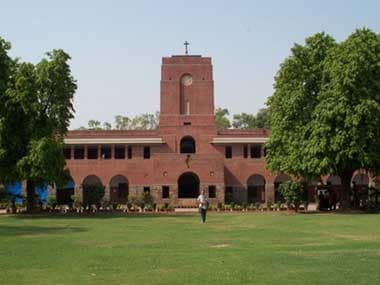The education sector in India is the untouched frontier when it comes to reforms. While economic reforms unleashed the country’s economic potential and governance reforms gave the state some semblance of transparency, education still flounders in the backwaters of India’s list of achievements. There is not a single Indian institution in the list of the world’s top 200 universities put together by the Times Higher Education magazine. The speed with which reforms such as the four-year course at Delhi University are being pushed through indicates a strong desire to remedy this. Close on the heels of this controversial move has come another decision that has raised the hackles of teacher unions, but been lauded by others as a required move towards academic excellence. The Centre through the Human Resource Development (HRD) Ministry is working on a plan to give greater autonomy to select colleges throughout the country. These will include Shri Ram College of Commerce (SRCC), Lady Sri Ram College (LSR), St Stephen’s in Delhi, St Xavier’s in Mumbai and Chennai’s Loyola College. And now, the University Grants Commission (UGC) has revived this proposa l, and plans to address it in a meeting later this month, reported DNA. The move will entail a few things. The colleges will become deemed universities, which will allow them to design their own curriculum, courses, structures, as well as avail of external funding and conduct independent examinations. The academic degree, however, will be awarded by the university it is affiliated to. [caption id=“attachment_865231” align=“alignleft” width=“380”]  St Stephen’s College Delhi. Image from Wikimedia commons.[/caption] Most of these colleges avail of heavy funding from the UGC, which in turn exerts heavy control and regulation over their functioning. The move will still provide the funds, but reduce control and thus give these institutions greater freedom. The decision, if it’s taken, will have both pros and cons. Autonomy can be considered a prerequisite for excellence. It is one of the reasons for the success of the IITs and IIMs. Being autonomous allowed these institutions to create their own areas of specialisation which differentiated them from other institutions. For example, while IIT Kanpur is known for its computer engineering course, IIM Bangalore is known for its finance section. While these are post-graduate courses, allowing graduate institutions to become autonomous will be in line with the market orientation move which was signaled by the four-year course at DU, which will allow students to pick both a major and a minor subject for specialisation. With autonomy, colleges will be able to craft courses according to differing needs of students, whether they are professional, vocational or extra-curricular, and even introduce short-term courses for working professionals. Autonomy will free colleges from the administrative control of the university itself. This, however, is a double-edged sword. While being free from the red tape of a large university will allow a college to dictate its own terms and demand a higher standard of learning and academic excellence, this freedom can also be misused. Lack of accountability is a worry which is high in everyone’s minds. A lack of a monitoring system or established parameters will be problematic. Allegations that the partially-autonomous Loyola College was selling seats were quickly cleared up, but the possibility of this phenomenon repeating itself is high. A lack of standardisation can also be problematic. If one college’s faculty is giving very high marks, and another isn’t, and this isn’t exclusively merit-based, it will be unfair to the students. Besides this, students and faculty will not have a higher authority to appeal to in case of problems with the college itself. The Delhi University Teacher’s Union, one of the largest unions for DU teachers, has flatly opposed the move. “This is the government’s way of privatising education, passing costs to students and destroying teacher unions,” said Professor Rajeev Konwar, a DU teacher and member of DUTA. Teacher’s unions will fragment and lose much of their bargaining power in case of autonomy, and a committee will have to be established which can still oversee their functioning and institutional issues. Another problem is funding. While colleges will be able to look for external funding and have independent tie-ups with external sources, UGC funding will have to remain constant to keep the financial pressure from landing on students and faculty. But the autonomy move might still work, if some factors are taken into consideration. Firstly, funding will have to remain fairly constant. If students’ fees and the faculty’s welfare are compromised, the entire move will be counter-productive. Not rushing into it is also important. An in-house quality control cell should be set up with every college, as well as establish thorough disclosure standards to avoid fees manipulation. The move towards autonomy will not work if all the constituents such as teacher’s unions do not participate, and if internal communication isn’t democratised. If, and only if, all these factors are taken into consideration, will it be a good idea to start setting the Indian education system free.
The Centre through the Human Resource Development (HRD) Ministry is working on a plan to give greater autonomy to select colleges throughout the country
Advertisement
End of Article


)

)
)
)
)
)
)
)
)



